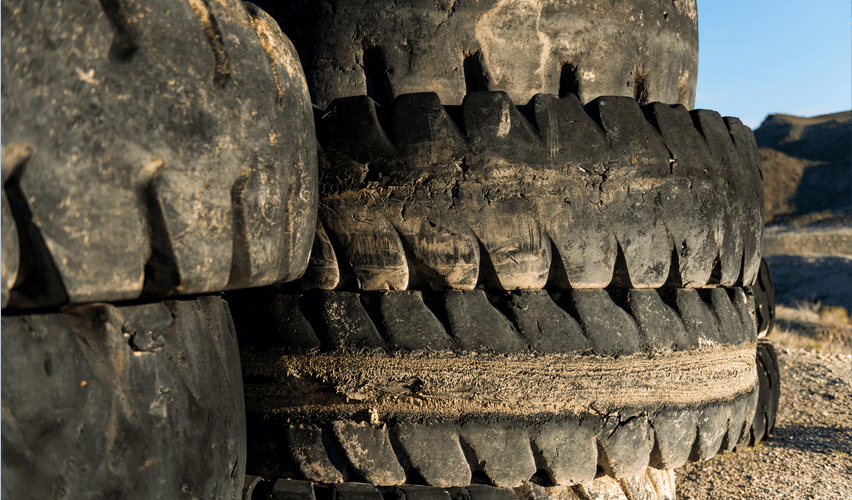How to Prevent Tire Dry Rot: A Complete Guide
Auto Shops Located in: Chapel Hill, Durham, Taleigh, Apex, and Cary North Carolina

With nearly 11,000 tire-related accidents occurring each year, drivers have to be more vigilant about monitoring the condition of their tires and maintaining them. One of the best ways to keep your tires in good condition is by preventing tire dry rot from occurring. When left unchecked, tire dry rot can increase your risk of a tire blowout and threaten your safety while you’re out on the road. If you want to protect yourself and other drivers, take a moment to learn how to prevent tire dry rot.
What Is Tire Dry Rot?
Also called sidewall weathering, tire dry rot occurs when the rubber of your tire begins to degrade. As the rubber degrades, cracks will form in the sidewall and tread, the tire’s color will fade, and your tire may struggle to maintain the correct amount of pressure. Since tire dry rot makes it easier for holes to develop in a tire and raises the risk of a blowout, you shouldn’t drive on any tires that are showing signs of dry rot damage.
How to Prevent Tire Dry Rot
Whether you want to know how to prevent trailer tires from dry rotting or just protect your car’s four tires, you can do so by following a few simple tips. As you try to stop tire dry rot from destroying your tires prematurely, review our top five tips for preventing tire dry rot below:
1. Pay Attention to Your Tires’ PSI
One of the simplest ways to prevent dry rot is to keep your tires properly inflated. If your tire doesn’t have enough pressure, it will create more heat and friction while you drive. This heat and friction can make your tread more brittle and cause cracking.
While many drivers put off refilling their tires until the tire pressure symbol pops up on their dashboard, you should be more proactive to prevent dry rot. Regularly check your tires to catch issues before your sensors do, and if your inspection shows that the tire’s PSI is under its optimal pressure, refill them as soon as possible.
2. Don’t Expose Your Tires to Direct Sunlight
If you regularly park your car directly in sunlight, the heat from the sun can hurt your tire’s rubber and cause the sidewall to break down prematurely. To prevent the sun from hurting your tires, you can use tire covers to stop the sun’s rays from reaching them. In general, however, keeping your vehicle in an indoor garage is the best way to protect your tires from the sun and other elements, but if you don’t have a garage, tire covers are your next best option.
3. Avoiding Corrosive Chemicals When Cleaning
When you’re cleaning your vehicle’s tires, avoid using cleaning supplies with corrosive chemicals. While these chemicals might make cleaning a bit easier, they can cause your tires’ rubber to degrade faster. Regardless of the cleaner you use, make sure it isn’t petroleum-based, as it can harm your tire’s anti-weathering defenses and speed up dry rot.
Since chemical-based cleaners can damage tires, water-based solutions tend to be the best choice. Try to clean your car’s tires at least once a month with your water-based cleaner, and follow the manufacturer’s instructions about how to properly apply the cleaner.
Does Tire Shine Prevent Dry Rot?
After you clean your vehicle, you might consider putting a tire dressing on it to enhance its appearance. While some tire shines can prevent dry rot, many are solvent-based. When a solvent-based tire dressing is applied to a tire, it can make the sidewall dry out, leading to cracks and tire rot.
Since solvent-based tire dressings can actually cause tire rot, the best tire dressing to prevent dry rot will be water-based. A water-based tire dressing with UV protection should protect your tires from the sun and your sidewalls from cracks, fading, and hardening.
4. Don’t Leave Your Car Stationary for Too Long
Even if you park your vehicle indoors or out of the sun, you shouldn’t let it sit in the same place over extended periods. When a car sits in the same position for too long, the portion of its tires that are touching the ground can become rigid, and the weight of the vehicle can cause the tires to deflate.
Since both of these issues can lead to tire rot, you’ll want to repark your vehicle every week to make sure one section of the tire doesn’t bear the brunt of your vehicle’s weight for months. If you really don’t ever drive your vehicle, you can also use a jack stand to lift your vehicle off the ground. Doing so redistributes the vehicle’s weight to the jack stand rather than the wheels.
5. Pay Attention to Your Tires’ Age, Load Capacity, and Routine Maintenance
Over time, all tires degrade and will need to be replaced. Even if you follow the other tips on this list, an older tire may still start to show signs of tire dry rot. Typically, tires need to be replaced every six to ten years, so checking the manufacturing date on the tire can help you know when your tire is more at risk of tire rot. If your tires are past the six-year mark, you’ll likely need to replace them.
Besides paying attention to the age of your tires, you should look at their load capacity. If you exceed your tires’ load limit by overloading your vehicle or transporting something heavy, the tires are more likely to degrade faster and experience dry rot. In addition to checking the tires, having your tires inspected and rotated annually can help you stop dry rot from beginning prematurely.
Choose Chapel Hill Tire for Tire Replacement Services in the NC Triangle
If your tires have dry rotted and you need tire replacement services in Durham, Chapel Hill, Raleigh, or the surrounding Triangle area, Chapel Hill Tire can help. When you suspect dry rot is affecting your tires, our mechanics can inspect them and provide a diagnosis. If possible, we’ll repair the tire, but if it can’t be fixed, our tire finder tool makes finding a new set of tires easy. We can also help you pick the right tires for your needs and replace your old tires with them.
Learn more about our tire repair and replacement services today. If you’re ready to bring your vehicle in, please make an appointment at one of our convenient locations in the Triangle area. We also recommend checking out our coupons to see how much you can save.















